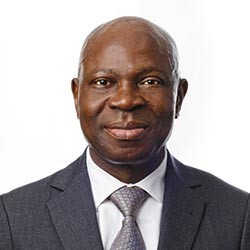World Food Prize Foundation International-Borlaug Dialogue, Gilbert F. Houngbo, IFAD President - Accelerating women's access to productive resources to produce more and better
IFAD Asset Request Portlet
Asset Publisher
World Food Prize Foundation International-Borlaug Dialogue, Gilbert F. Houngbo, IFAD President - Accelerating women's access to productive resources to produce more and better
25 October 2021Thank you for inviting me to talk today about a topic that is very dear to my heart.
Women are playing an ever more important role in producing the food we eat. In sub-Saharan Africa, they are about 60 per cent of those working in agriculture.
The wide-ranging benefits of investing in empowering women are well documented. If women in agricultural production worldwide had the same access to productive resources as men, they could increase yields on their farms by 20–30 per cent and raise global agricultural output by between 2.5 and 4 per cent.
When a woman earns more money, she tends to invest it in her family. There is good evidence that a woman’s education, health, nutrition, and decision-making power have a direct impact on the nutrition and health of her children and entire family.
But women around the world tend to be excluded or overshadowed by men when it comes to economic opportunities. We see this, too, in rural communities, where men all too often dominate the most profitable activities of marketing and selling farm produce, leaving women to the less profitable area of production.
In addition, in some parts of the world, traditional practices and attitudes are often entrenched in rural communities. As a result, women have less access to education, less access to finance, and less access to productive resources, such as land and water.
Women spend far more time than men in unpaid work – cooking, fetching wood and water, and looking after the young and the elderly – leaving them less time for work that would generate income.
Today, 80 per cent of the world’s poor and two-thirds of the hungry live in rural areas and depend on natural resources for their livelihoods. Indigenous peoples, women and youth are particularly vulnerable to poverty. Too often, they are the ones most affected by climate change.
At IFAD, we know we will not fulfil our mandate to eliminate poverty and hunger in rural areas unless we reach and empower women. That’s why gender equality is an integral part of our programmes, and why women make up half of those reached by the projects we support.
There is also a clear nexus between gender equality and climate change. IFAD is committed to mobilising US$500 million of climate financing by 2024. Helping rural women, and girls, adopt climate resilient techniques will be a priority in this programme.
At IFAD, we talk about transformative change in gender roles and relations. Working with local people, using our household methodologies, has led to more men actively participating in domestic chores; women having more autonomy to make independent purchases, including land; and women buying and selling livestock, and other produce.
As a result, households enjoy greater food security, and more children are attending school. We have also observed the marked reductions in gender-based violence.
Increasing gender equality can deliver strong economic growth. It can help cut extreme poverty and reduce chronic hunger. It can promote peace. And it can benefit entire families and empower all those who face discrimination.
As we strive for more sustainable food systems, and communities that are more resilient to climate change, women should be fully integrated into the business models of agriculture supply chains.
Investing in rural women leaders and involving them more closely in creating our post-COVID future is critical.
As we learn the lessons of the pandemic and accelerate our battle against rural poverty, we must ensure that women’s perspectives and needs are considered. We must build back better, with women at the forefront, food systems that provide equal access to nutritious food - and decent livelihoods for all.
